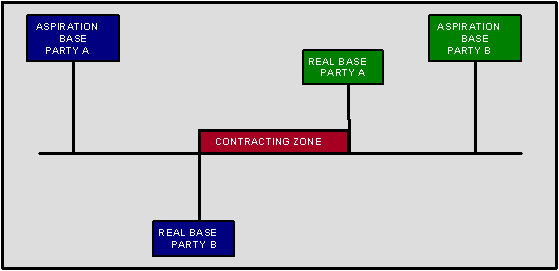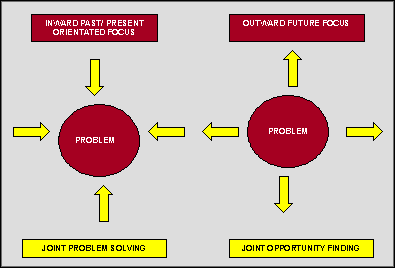


| 10 Key Lessons from the World of Negotiation - Part 1 of 2 |  |
| 10 Key Lessons from the World of Negotiation, ten negotiation tips negotiation secrets, London UK. Negotiation Skills Training for Professional Sales Teams. Upgrade skills with negotiating Sales Training. |
In your negotiations, if you could quickly learn the 20% that would reward you with 80% of the results you seek, would you invest 15 minutes of your reading time? In this article I focus on the Pareto principle to bring you my 10 top secrets for your negotiation success.
Many managers tell us that time pressures both deny them participating in a quality negotiation course, as well as not affording them quiet moments to delve diligently into the complexities examined in many negotiation books. Other busy business people are under great pressure and crave a "crib-sheet" to rely upon shortly before the crunch of that all important negotiation. While it's undeniably true that a negotiator who has trained properly and prepared fully will inevitably hold the advantage over those who merely skim the surface, we see value in having a top 10 guidance sheet. These lessons are not shared as a panacea 'cure all', so please consult us directly should your negotiation challenges not be sufficiently addressed in this article.
Having walked the negotiation trail for many years, I have had the privilege of repetitively experiencing the most important determinants of a successful negotiation. Without in any way suggesting that the ten lessons I am about to share constitutes a fail-safe recipe, I do believe that they will, if applied correctly, substantially enhance the negotiation performance of a manager.
Lesson 1 - Know your Aspiration Base
Sadly, too many managers enter a negotiation without having clearly defined the optimal goal they are aspiring to achieve in that negotiation, or aspire to a goal which is far too low. This inevitably results in an outcome that is way beneath what could have been achieved, as their low aspiration target is very likely be eroded by the concessions they will need to make to advance the negotiation. Their underlying psychology and expectation often results in little more than a split-the-difference exercise. Not a positive display of business negotiation skills.
Negotiators need to appreciate that the initial target they set is the outer limit of what they could achieve, and that there is no way in which the outcome will extend beyond this target; it will in fact only move the other way. Furthermore, they also need to appreciate that their aspiration base set the other party's minimum expectation.
|
Remember:
|
Lesson 2 -Know your Real Base
As important as it is to develop a high aspiration base, negotiators must also know when to walk away from the negotiation. Not clearly defining this point beforehand inevitably results in a tendency to stay in the negotiation beyond the point where it is meaningful. Trying to ascertain this point as the negotiation unfolds is highly dangerous as it may then be psychologically very difficult to act against the flow.
Know what it is that you must have if the negotiation is not to be a self-destructive exercise.
|
Remember:
|

Lesson 3 - Know your Best Alternative to a Negotiated Agreement
Before entering a negotiation it is imperative that a negotiator determines what his/her BATNA would be should an agreement not be possible. Where would a walk-away leave him/her in terms of satisfying his/her interests? What alternative way would there be for satisfying his/her interests? Unless negotiators are very clear on whether they can walk away from a negotiation and what options would be available to them if they should, they will inevitably find themselves heavily pressurised to reach an agreement, as they will then be pessimistic about the consequences should the negotiation not succeed. A good BATNA allows a negotiator to be firm when negotiating, and provides the power and confidence needed to walk away from a negotiation when an agreement that is mutually beneficial is not possible.
A BATNA is the best outcome a negotiator can expect if the negotiation results in an impasse. It is, as Fisher and Ury (1981: 104, 111) explain it, "the standard against which any proposed agreement should be measured" as it "determines what a minimally acceptable agreement is" . In the case of an employment offer, the BATNA could therefore represent an alternative offer.
|
Remember:
|
Lesson 4 - Focus on Interests not Positions
Negotiators generally enter a negotiation with predetermined positions underpinned by one or more interests - basic needs, fears, desires, hopes, expectations, etc. Whereas positions represent an approach they have decided to adopt, interests are that which gave rise to their decision to adopt certain positions. Merely therefore focusing on positions in a negotiation invariably causes a protracted I vs. I tug of war, where the parties try to drag each other towards their positions. The result is usually an impasse or a win-lose outcome.
The challenge for negotiators is to look beyond the positions initially communicated and to uncover and explore the interests that gave rise to these positions. Once the parties have explored their respective interests, they very often are able to agree an outcome not initially contemplated by either, but which satisfies their respective interests far better than a long drawn-out test of strength.
When parties are aware of each other's interests they more often than not discover that the interests they share considerably outweigh their conflicting interests and that it is possible to mould their common interests into a Win More! mutually acceptable agreement by working together.
|
Remember:
|

Lesson 5 - Check your Assumptions - They tend to be Wrong
One of the greatest dangers negotiators face is their tendency to assume certain things without checking that these assumptions are correct. This very often not only leads to the other party being framed in a particular way, but also results in inappropriate attitudes and behaviour that prevent a mutually beneficial agreement from being concluded. Where two parties, a developer and an environmentalist, are for example negotiating an industrial development near a very sensitive wetland, and the developer believes the environmentalist is, as are all environmentalists, part of a lunatic fringe that is hell-bent on preventing all development, this will strongly influence how the developer approaches the environmentalist. Although the developer's assumption may be totally unfounded, it unfortunately could, as all too often happens, become a self-fulfilling prophecy, as it is likely to compel the environmentalist to act accordingly.
|
Remember:
|
[Part 1] [Part 2]
Back to Negotiation Articles
Please feel free to share this article by republishing the contents of this page in part or full. All that we ask is you include a regular link back to this site, preferably to our www.calumcoburn.co.uk/training/ page.
|
Reader Comments
Average Reader Rating:
share your comment |
|
|
No comments |






Reader Comments
Average Rating:
Total Comments: 0